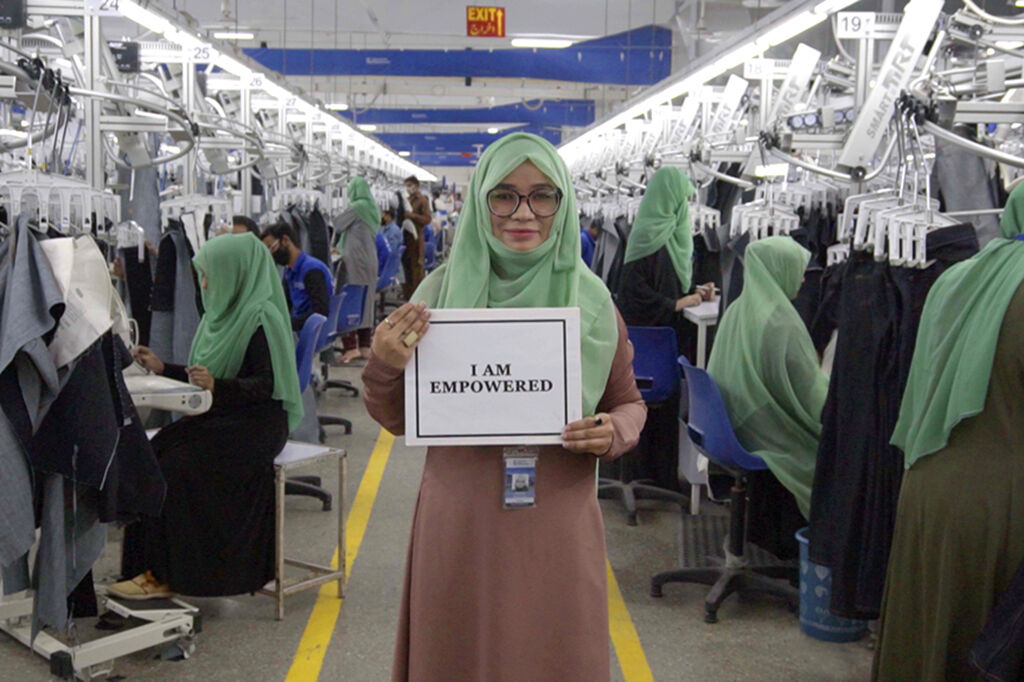
“Fair trade has given our workers a new sense of direction to work harder and a chance at a better life.”
Amina Younas wakes up at 6:30am to cook breakfast for her husband and four children. She makes sure the house is stocked with all necessary supplies before the company bus comes to pick her up at 7:30. Amina works as an operator in the stitching department in the garment division at Artistic Milliners, a Fair Trade Certified™ factory in Pakistan. When her shift ends at 5:30pm, she returns home from work, cleans the house, and cooks dinner for her family. She goes to bed at 10pm. An end to another laborious day, but she says, “It’s all worth it because my family is safe and sound at the end of the day.”
This is what a typical day looks like for a majority of female factory workers. To say that they are hardworking would be an understatement. They juggle multiple roles to make the ends meet and support their families. At Artistic Milliners, our workforce is our biggest asset, and we made a commitment years ago to invest in our workers and facilitate their personal and professional progress. With that in mind, a series of training programs were initiated for our workers, equipping them with skills including health awareness, life skills, financial literacy, and adult literacy. It helped us create systems that allow for workers’ representation and autonomy. When we found out about fair trade certification, while it was very sophisticated, we felt we were a natural fit, particularly when it comes to the Fair Trade Committee structures. The fair trade standard requires, among other things, that workers be able to organize and participate in Fair Trade Committees, empowering them to engage in dialogue and proactive problem-solving of their community’s greatest needs. These representatives are the voice of the workers who decide how to spend Fair Trade Community Development Funds, keeping the best interests of their people in mind. With extensive focus on worker empowerment and development, our workers have the right mindset to not only manage the funds, but also address the needs of their peers with utmost fairness.
Twelve years ago, Amina’s world was shaken when her husband Younas was diagnosed with an abdominal tumor, which would require expensive treatment. He was immediately put on bed rest, making Amina the sole breadwinner of the family. She knew she had to work to keep a roof over her family’s heads. That’s when she joined Artistic Milliners. In these twelve years, Amina has provided for her family by taking on different roles: mother, wife, caregiver, and employee. She is the reason her family has a place to call home.
At one point, the ever-increasing health expenses of her family became too much. Due to her husband’s treatment, it became difficult for her to pay rent or even buy essential groceries to feed her family. Amina resorted to asking for loans from her acquaintances, but to no avail.
Still, Amina had an unwavering faith even during difficult times that the sufferings and sadness will soon be replaced by joy. “A person always wishes for something,” she says. “Sometimes those wishes are fulfilled, sometimes they aren’t. What I have learned is that I should never lose hope even if I don’t get what I wish for, because eventually life gives us something better.”
Many other workers were experiencing the same struggle to afford groceries. That’s when the Fair Trade Committee at Artistic Milliners decided to allocate Community Development Funds toward buying grocery gift cards for the workers at Artistic Milliners, including Amina. As soon as she found out that she was eligible to receive a grocery card to purchase essentials, she was thankful. She didn’t have to worry about food supplies anymore. She felt at peace, grateful her voice was heard.
“I am happy I don’t have to resort to asking for financial help from others, as I now feel more self reliant,” says Amina. “My company also offered me a financial literacy course where I gained working knowledge of opening a bank account, budgeting, and insurance. This learning made it much easier for me to manage my finances more prudently. I have never felt more empowered in my life, thanks to Artistic Milliners.”
The fair trade certification has further deepened our way of thinking about our workers’ well-being, both at management and staff levels. With the help of fair trade certification, Artistic Milliners has been able to promote safer working conditions, improved livelihoods, sustainable production, and the development of knowledge, skills, and resources for thousands of lives. Fair trade is a way for the consumer to give back directly in ways that will help change lives like Amina’s—in this case, mitigating ongoing socioeconomic challenges that daily wage workers face and enabling financial resilience.
“Amina and other workers care deeply about fair trade and the values it represents, as they have helped her become a more financially independent person,” says Mehwish, a Fair Trade Committee member at Artistic Milliners. “She feels like her hard work has been acknowledged and rewarded. Fair trade has given our workers a new sense of direction to work harder and a chance at a better life.”
Women make up nearly 80 percent of the garment industry workforce. Take action to support workers like Amina by shopping ethically and seeking out Fair Trade Certified styles.